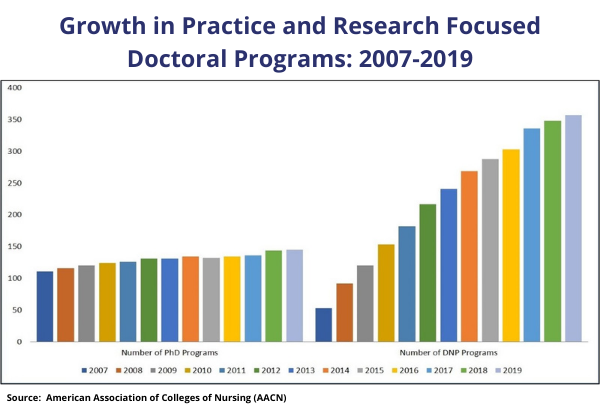As more nurses prepare to further their careers and advance their education, the choice between a Doctor of Nursing Practice (DNP) and a Doctor of Philosophy in Nursing (Ph.D. in Nursing) degree can be overwhelming. While they’re both terminal degrees, the DNP and Ph.D. are two very different pathways in nursing. Because each degree has its own admission requirements, scope of practice, and career outcomes, it’s important for prospective doctoral nursing students to fully understand how the DNP vs. Ph.D. programs differ.
In this guide, you’ll find more clarity on the two different doctorate programs, from curriculum and program admission requirements to salary and job outlook.
What is a DNP degree?
A Doctor of Nursing Practice (DNP) is a terminal degree that focuses on the clinical advancement of the nursing profession. Upon graduation, DNP-prepared nurses have the tools to use evidence-based practice in a clinical setting and in high-level leadership roles.
What is a Ph.D. degree?
A Doctor of Philosophy (Ph.D.) is a terminal degree that heavily focuses on research and prepares graduates to work as educators or researchers. Ph.D. candidates are active educational theory analysts and are taught to apply that knowledge in the classroom.
DNP curriculum & admission requirements
A DNP program prepares its students for advanced nursing clinical skills. The program is practice-focused, with a Capstone or DNP Project needed for graduation. In addition, the program requires students to complete 1000 clinical practice immersion hours. But the time it takes to complete the program varies by school. (Note: Aspen University’s online DNP program can be completed in as little as 24 months.)
Admission to most DNP programs require:
- The applicant to have a current, unrestricted license as a registered nurse (RN) in the United States or a U.S. territory
- Evidence of a master’s degree in nursing (MSN) or a relevant discipline
- GPA of 3.0 or greater
Are you considering a DNP degree but not sure if you’re prepared to go back to school? Here are three signs that you’re ready to pursue your DNP.
Ph.D. curriculum & admission requirements
A dissertation consisting of original research is needed to complete the Ph.D. program. Throughout the program, graduates are prepared for research-focused careers. Depending on the school, a Ph.D. can take three years to complete.
Admission to a Ph.D. program generally includes:
- Unrestricted license as a registered nurse (RN)
- Letter of recommendation
- Master of Science in Nursing (MSN)
- Interview with faculty
- GRE scores may be required
- Writing sample
- GPA of 3.0 or better
DNP scope of practice
Because the DNP is a practice-focused degree, many nurses obtain their DNP as a requirement for an advanced practice role. DNP-prepared nurses work in high-level or advanced roles such as:
- Nurse Practitioners
- Chief Executive Officers
- Nurse Anesthetists
- Chief Nursing Officers
- Chief Clinical Officers
- Clinical Nurse Specialists
Where DNPs work
- Hospitals
- Nursing Homes
- Home healthcare agencies
- Managed care organizations
- Consulting firms
- Medical supply companies
- Pharmaceutical companies
- Insurance companies
DNP salary and job outlook
Salary for DNP-prepared nurses depends on the role, experience, location, and organization. In general, the job outlook for RNs is expected to grow 7% through 2024.
- According to The U.S. Bureau of Labor Statistics (BLS), the median annual wage for nurse anesthetists, nurse midwives, and nurse practitioners was $117,670 in May 2020.
- Payscale determines that nurse executives earn $121,423 per year.
- Salary.com points out that the average Clinical Nurse Specialist salary in the United States is $109,054 as of May 27, 2021.
- Payscale also found that clinical nurse leaders earn around $70,636 annually.
- For healthcare management in general, employment is projected to grow 32% through 2029.
Ph.D. scope of practice
Ph.D. programs develop students' research and writing skills and prepare students to use research to advance nursing practice. Most PhD-prepared nurses work as:
- Nurse educators
- College professors
- Researchers
- Health policy
Where Ph.D. nurses work
- Colleges
- Universities
- Hospitals
- Pharmaceutical companies
- Medical laboratories
- Research facilities
- Government agencies
Ph.D. salary and job outlook
Salary for Ph.D. nurses also depends on job location, education level, experience, and organization.
- As of 2020, the BLS reports that 61,100 nurses work as nursing teachers and educators nationally.
- The BLS also projects the employment of nursing instructors and teachers will grow by 18% by 2029.
- The mean salary of nurse teachers and educators is $84,060, according to the BLS. The highest-paid nurse educators can earn $133,420.
- According to Indeed, nurse researchers earn an average salary of $79,459.
DNP vs. Ph.D. The Bottom line
The goal of the DNP program is to provide nurses with the foundation to excel in advanced clinical nursing practice. In contrast, the Ph.D. is more research-focused and may be better suited for pursuing a career in academia. DNP programs require clinicals or practicals, and the Ph.D. programs require research for a dissertation.
| Title | DNP | Ph.D. |
| Focus | Nursing practice (clinical-focused) | Nursing Research |
| Curriculum |
|
According to the American Association of Colleges of Nursing (AACN):
|
| Clinical Practice Hours Needed | 1000 | None |
| Dissertation | No | Yes |
| Point of Entry | MSN or relevant discipline | MSN |
| GRE Requirement | No | Program preference |
| Job Roles |
|
|
If you are interested in advancing your clinical expertise or becoming a nurse leader, consider an online DNP program with Aspen University.
The article originally appeared on Aspen University's Altitude blog, written by Portia Wofford. Aspen University is a United States-based private, for-profit, accredited distance-learning university, reputable for its affordable nursing programs, including its online DNP program. Altitude is the official blog of Aspen University that features informative nursing articles, compelling tips, and professional accomplishments.



